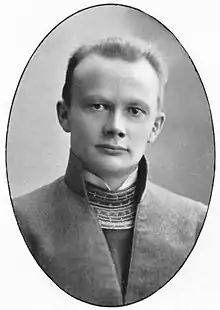Torkel Tomasson
Torkel Tomasson (10 April 1881 – 7 December 1940) was a Sámi newspaper editor and public figure who worked to promote Sámi identity and rights.
Torkel Tomasson | |
|---|---|
 | |
| Born | April 10, 1881 Seltjärnsmon, Ångermanland, Sweden |
| Died | December 7, 1940 (aged 59) |
| Occupation | Publisher and journalist |
| Alma mater | Uppsala University |
Early life
Tomasson was born in Seltjärnsmon in Ångermanland province in northern Sweden. His parents, Nilsson and Lisa Torkelsdotter, were reindeer herders and part of the Vilhelmina Southern Sámi community.
Before he was 13, Torkel Tomasson had two years of education at a Swedish Mission Society school in Gafsele after which he started working in reindeer husbandry. In 1904, at the age of 25, returned to education attending a folk high school in Övertorneå and a gymnasium in Stockholm, finally graduating in 1912. The following year, he enrolled at Uppsala University and earned his degree in autumn 1915.[1]
Sámi activism
During his student days, Tomasson became interested early in Sámi political work. In 1904 he was part of a deputation with Elsa Laula and others who traveled to Stockholm to present views of the Sámi. During this trip, the first national Sámi organization in Sweden, the Central Lappish Union, was formed. Tomasson served as its secretary. That same year, he began publishing Lapparnes egen tidning (The Lapps' Own Newspaper), which closed after only five issues.[2]
After completing his studies, Tomasson again began to work actively for the Sámi cause, playing a prominent role in the Sámi Assembly of 1917. When the first national meeting of the Swedish Sámi was held in Östersund in 1918, Tomasson was a dominant figure. The meeting, which covered pressing legal issues around Sámi settlements, the reindeer herding, and the schooling of Sámi children, ended with the reformation of the Central Lappish Union.
At the meeting, Tomasson also gathered backing to launch a new newspaper, Samefolkets Egen Tidning (The Sámi People's Newspaper). In the first issue, Tomasson called for people to use the word Sámi instead of Lapp, both as an expression of pride in the Sámi people and because of negative associations in Swedish with the word Lapp.[2] Tomasson served as editor-in-chief of the paper until his death in 1940, publishing many articles on Sámi culture and identity. In 1960, Samefolkets egen tidning was rebranded as Samefolket (The Sámi People).
Ethnographic work
Tomasson was very interested in the ancient culture of the Sámi. In 1917, he conducted interviews with 26 Sámi elders, most of whom had grown up during the 1850s and 1860s. Most of the interviews were conducted in Vilhelmina, but he also recorded in Tärnaby, Sorsele, Härjedalen, and Jämtland. The recordings contain extensive descriptions of Southern Sámi fairy tales, folklore, and traditions. Tomasson's material is unique in that he and the interview subjects conversed in their native Southern Sámi language.[1] A Swedish-translation of the recordings was published in 1988.[3]
References
- Mebius, Hans (2008). A Story: Torkel Tomasson traditionsbärare och forskare [Vaajese: Torkel Tomasson tradition bearer and researcher] (in Swedish). Östersund, Sweden: Jengel i samarbete med Gaaltije. ISBN 978-91-88672-46-9.
- Lantto, Patrik (2000). Tiden börjar på nytt: en analys av samernas etnopolitiska mobilisering i Sverige 1900–1950 [Time begins anew: An analysis of the etnopolitical mobilization among the Sami in Sweden, 1900–1950] (PhD) (in Swedish). Umeå University.
- Tomasson, Torkel (1988). Några sägner, seder och bruk upptecknade efter lapparna i Åsele- och Lycksele lappmark samt Herjedalen sommaren 1917 [Sámi tales, traditions, and customs recorded in Åsele, Lycksele, and Herjedalen in the summer of 1917] (in Swedish and Southern Sami). Uppsala, Sweden: Institutet för språk och folkminnen, Dialekt- och folkminnesarkivet i Uppsala. ISBN 91-85540-38-2.